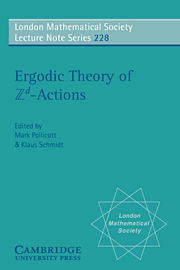Book contents
- Frontmatter
- Contents
- Introduction
- Surveys
- Research Papers
- 1 Uniformity in the polynomial Szemérdi theorem
- 2 Some 2-d symbolic dynamical systems: Entropy and mixing
- 3 A note on certain rigid subshifts
- 4 Entropy of graphs, semigroups and groups
- 5 On representation of integers in Linear Numeration Systems
- 6 The structure of ergodic transformations conjugate to their inverses
- 7 Approximatiom by periodic transformations and diophantine approximation of the spectrum
- 8 Invariant σ-algebras for ℤd-actions and their applications
- 9 Large deviations for paths and configurations counting
- 10 A zeta function for ℤd-actions
- 11 The dynamical theory of tilings and Quasicrystallography
5 - On representation of integers in Linear Numeration Systems
Published online by Cambridge University Press: 30 March 2010
- Frontmatter
- Contents
- Introduction
- Surveys
- Research Papers
- 1 Uniformity in the polynomial Szemérdi theorem
- 2 Some 2-d symbolic dynamical systems: Entropy and mixing
- 3 A note on certain rigid subshifts
- 4 Entropy of graphs, semigroups and groups
- 5 On representation of integers in Linear Numeration Systems
- 6 The structure of ergodic transformations conjugate to their inverses
- 7 Approximatiom by periodic transformations and diophantine approximation of the spectrum
- 8 Invariant σ-algebras for ℤd-actions and their applications
- 9 Large deviations for paths and configurations counting
- 10 A zeta function for ℤd-actions
- 11 The dynamical theory of tilings and Quasicrystallography
Summary
Abstract
Linear numeration systems defined by a linear recurrence relation with integer coefficients are considered. The normalization function maps any representation of a positive integer with respect to a linear numeration system onto the normal one, obtained by the greedy algorithm. Addition is a particular case of normalization. We show that if the characteristic polynomial of the linear recurrence is the minimal polynomial of a Pisot number, then normalization is a function computable by a finite 2-tape automaton on any finite alphabet of integers. Conversely, if the characteristic polynomial is the minimal polynomial of a Perron number which is not a Pisot number, then there exist alphabets on which normalization is not computable by a finite 2-tape automaton.
Introduction
In this paper we study numeration systems defined by a linear recurrence relation with integer coefficients. These numeration systems have also been considered in [Fra] and [PT]. The best known example is the Fibonacci numeration system defined from the sequence of Fibonacci numbers. In the Fibonacci numeration system, every integer can be represented using digits 0 and 1. The representation is not unique, but one of them is distinguished : the one which does not contain two consecutive l's.
Let U be an integer sequence satisfying a linear recurrence. By a greedy algorithm, every positive integer has a representation in the system U that we call the normal representation. The normalization is the function which transforms any representation on any finite alphabet of integers into the normal one. From now on, by alphabet we mean finite alphabet of integers.
- Type
- Chapter
- Information
- Ergodic Theory and Zd Actions , pp. 345 - 368Publisher: Cambridge University PressPrint publication year: 1996
- 1
- Cited by

